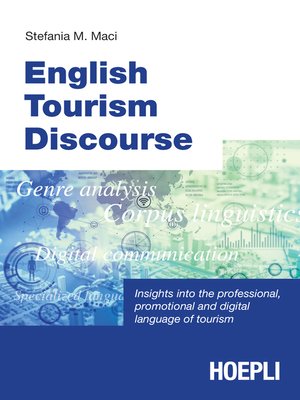English Tourism Discourse
ebook ∣ Insights into the professional, promotional and digital language of tourism
By Stefania M. Maci

Sign up to save your library
With an OverDrive account, you can save your favorite libraries for at-a-glance information about availability. Find out more about OverDrive accounts.
Find this title in Libby, the library reading app by OverDrive.



Search for a digital library with this title
Title found at these libraries:
| Library Name | Distance |
|---|---|
| Loading... |
In the last few decades, the rapid growth of the demand-supply processes in the travel sector has caused a dramatic development of the tourism industry. In order to sell the same product to different targets and on different markets, tourist organizations need to develop different genres presenting the same content with the same illocutionary purpose. This is linguistically attained thanks to the elaboration of professional, promotional and digital forms of discourse which employ rhetorical strategies complying with the use of particular lexical items, specific syntactical structures and precise textual levels of the language employed. By combining corpus linguistics and genre analysis, this volume aims to investigate if and to what extent tourism discourse dynamically reflects those new societal trends that have caused any development of the tourism industry. The results suggest that tourism discourse seems to have developed new linguistic strategies in both specialized and promotional purposes, characterized by the rise of a new hypertextual mode of communication euphorically describing the destination and conveying the idea that tourists are solely responsible for their choice of off-the-beaten-track destination. This volume, primarily aimed at undergraduate and postgraduate students, may also be of interest to any researchers or scholars interested in tourism discourse from a sociosemiotics perspective and discourse analysis. The corpus-based approach makes this the ideal introduction for all students and scholars interested in tourism discourse.







